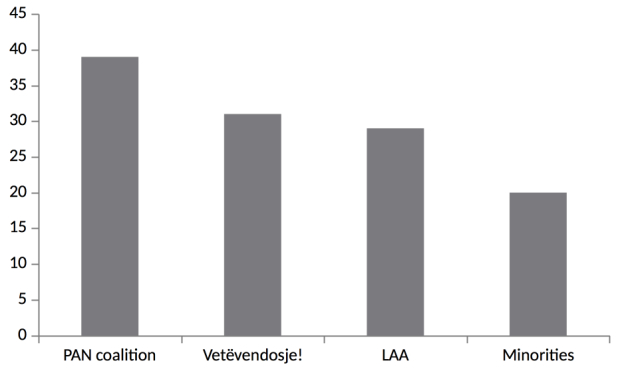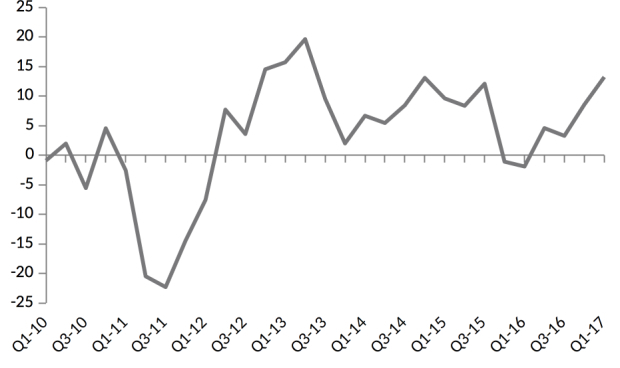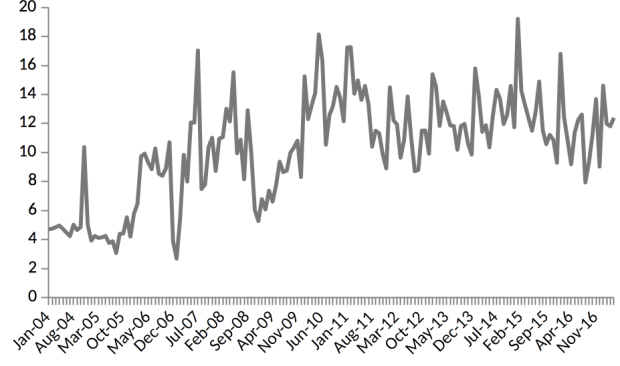Difficult negotiations ahead in Kosovo
19 June 2017
The election result was inconclusive, and there is no obvious coalition. It may take some time to form a government, but the economy is unlikely to be materially affected.
BY PËLLUMB ÇOLLAKU, VLADIMIR GLIGOROV AND RICHARD GRIEVESON
With 99.88% of the votes counted, results show that the PAN coalition (the so-called “war coalition”, made up of the PDK, AAK-NISMA, and nine other small parties) took 33.92% of the vote in the Kosovo general election. The left-wing Vetëvendosje! came second with 27.16%, and the LAA coalition (the so-called “peace coalition”, made up of the LDK and AKR-Alternativa) took 25.79%. The Serb list won 5.88%. A monitoring mission from the Organisation for Security and Cooperation in Europe (OSCE) judged the conduct of the election as “orderly” and “without major irregularities or incidents”.
The results give the PAN coalition 39 seats in the 120-seat parliament. Even with the support of 20 seats reserved for ethnic minorities, this is not enough to form a government. Vetëvendosje! have 31 seats, and the LAA coalition 29. As a result, the PAN coalition will have to find another partner. The result was somewhat surprising. Few had expected Vetëvendosje! to come second, while the PAN coalition had hoped to gain more seats (several opinion polls had them above 40% in the run-up to the election).
Vetevendosje! benefitted from widespread discontentment with established parties and desire for change
The main story of the election was the strong performance by Vetëvendosje! The party did well for three main reasons:
- The previous government, a coalition between the PDK and LDK, failed to deliver on key issues that voters care about. In particular, many voters have been unhappy about the ratification of the border demarcation with Montenegro and the design of the agreement on Serb municipalities in Kosovo. Moreover, the PDK in particular are viewed by large sections of the population as being corrupt and acting only in their own interests.
- The party appealed strongly to young voters. Vetëvendosje! were seen as a party offering change from the established political forces. Many new young voters were on the ballot for this election. In particular, Vetëvendosje! appears to have done well with younger voters who are educated and lived in urban areas. Large numbers of young people attempted to emigrate in recent years, notably to Germany, but failed to gain economic asylum and have been sent back. These voters were angry and voted for change.
- Vetëvendosje! have ruled Pristina, the capital, for three years, and the population is generally happy with what they have done there. This has included the provision of a 24-hour water supply, improvements in public transport, reforms of the municipal administration, and a halt to illegal construction in the city.
What happens now?
Having won the highest share of the vote, the PAN coalition will have the first opportunity to form a government. However, the LDK has officially refused to consider going into coalition with the PDK again. The previous government, led by the LDK and in coalition with the PDK, lost a vote of no confidence which was supported by the PDK. Many within the LDK remain angry about this.
However, the LDK said the same after the previous election, but after six months of wrangling, and with some outside pressure for a deal, eventually formed a government with the PDK. The PDK could also likely to be willing to make some compromises in order to cooperate with the LDK to keep Vetëvendosje! out of power. Vetëvendosje! focused part of their pre-election programme on improving the judicial system and rooting out corruption. Some PDK figures are alleged to have been involved in corrupt practices in the past, and could therefore be targeted if Vetëvendosje! came to power.
Prospects for an LAA- Vetëvendosje! coalition
If the PAN fails to form a coalition, the president can then ask other political groups to try to form a government. This raises the possibility of a coalition between the LAA and Vetëvendosje!
Vetëvendosje! said initially that it would not join either of the main groups in government. Clearly for a party seen as anti-establishment there would be some risks. Vetëvendosje! has alleged that both parties are corrupt discredited by their previous time in office. However, in a recent press conference, Albin Kurti, the Vetëvendosje! candidate for prime minister, called on the LAA to consider the prospect of the two forming a coalition together.
The response of international actors will be significant. Previously, the EU has been wary of Mr Kurti because of his stance towards Serbia, and this could yet prove to be a sticking point. The LAA could find itself pressured again by the international community to go into coalition with the PAN coalition, in order to continue the current set-up of Kosovo-Serbia talks. However, from the Serbian side, it is not clear that they will see the prospect of talks with Mr Kurti as any worse than with the PDK. Serbia regards Ramush Haradinaj, the PAN coalition’s candidate for prime minister, as a war criminal, and has a warrant out for his arrest.
In addition, the US embassy held talks with the leaders of Vetëvendosje! and the issue of continued negotiations with Serbia are sure to have been discussed. There are a number of ways for the new government to continue to engage with the Serbian government by claiming that this is what sovereign governments indeed do. One assumes that will be the EU and US message. Any Kosovo government cannot disregard the messengers even if it dislikes the message.
What would Vetëvendosje! want?
Vetëvendosje! are not as nationalist as sometimes portrayed. They are opposed to negotiations with Serbia within the current format, but ready to cooperate with the Kosovo Serbs. In general, their priorities would be a strong line on negotiations with Serbia, an improvement in the rule of law in Kosovo, the enforcement of an anti-corruption programme, and economic development of the country (including improvements in education and infrastructure). The party also wants to improve social protection; Mr Kurti has said that he wants to move Kosovo in the direction of a Nordic-style welfare state model.
Will this affect the economy?
A long period of political stasis, or a rise in political risk, won’t significantly affect the economy. Remittance growth is strong, with nominal euro-denominated inflows rising by 13% year on year in the first quarter of 2017. Exports are booming, albeit from a tiny base, rising by an average 29% year on year in March-April in nominal terms. FDI inflows could be affected by political noise, but probably won’t be. Most FDI in Kosovo is linked to the diaspora; FDI investors in Kosovo know what they are getting into.
More broadly, the key for Kosovo’s long-term economic development remains building a larger export base. This requires two things: i) higher investment in productive capacity, and ii) better access to regional markets—especially Serbia—to export to. While neither will change overnight, a government including Vetëvendosje! could potentially make more progress than previous administrations have managed.



